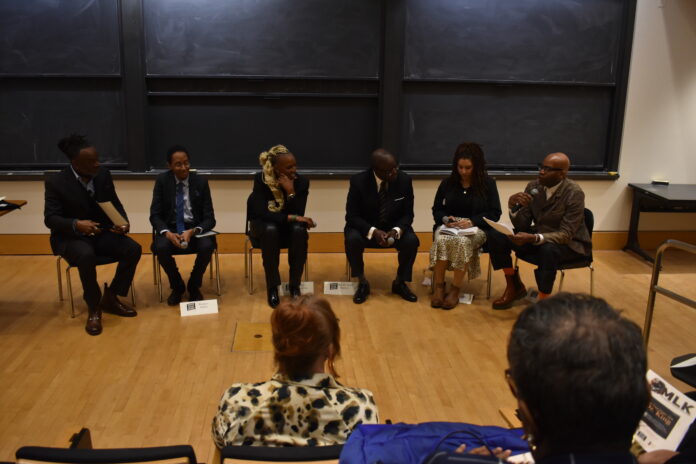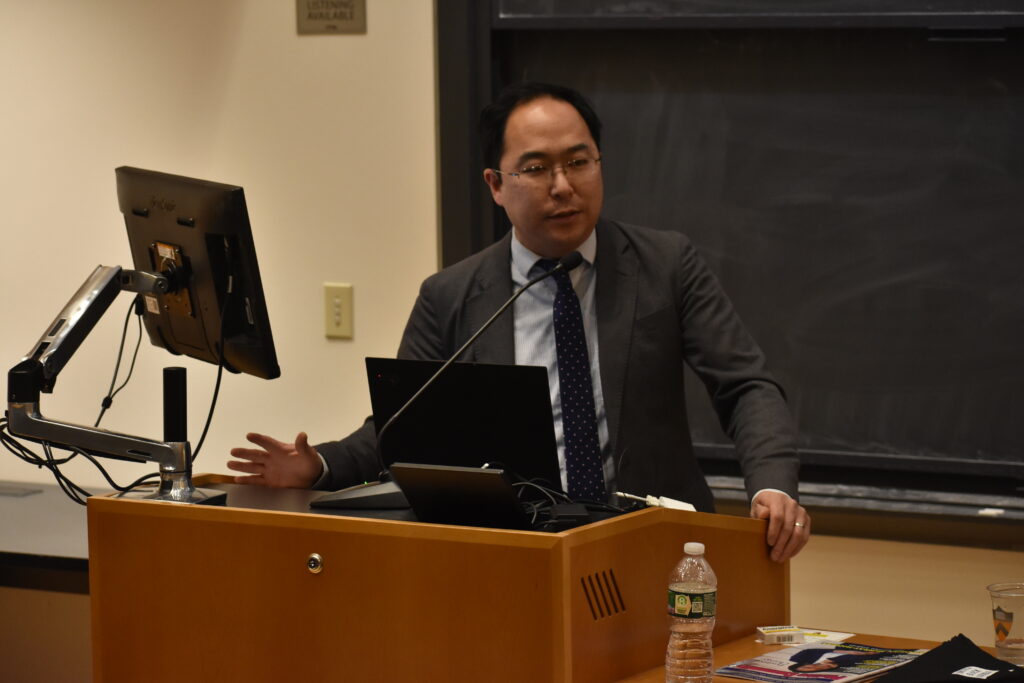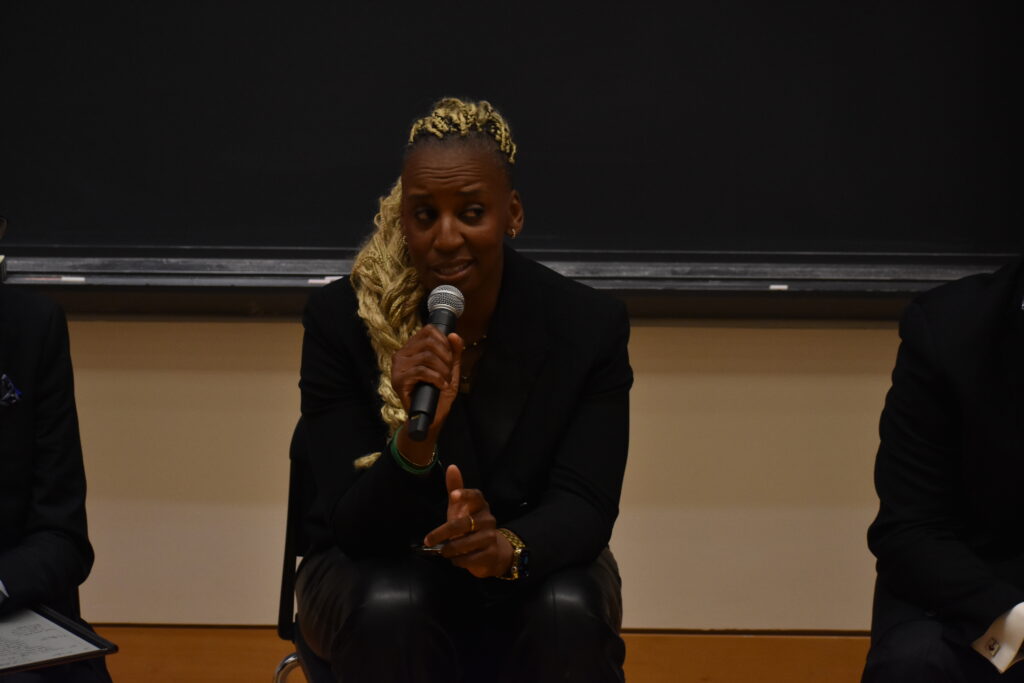
An evening inside the Princeton University Friend Center turned silent when 20-minutes of Dr. Martin Luther King Jr.’s “I’ve Been to the Mountaintop” speech filled an auditorium as part of an event to not just reflect but have a conversation on King’s economic vision.
King’s speech played on April 3 at the Friend Center, which also marked 56 years that day since King spoke the words of what would be his final and prophetic speech before he was assassinated the following day in 1968.
The “One Last Night with Dr. King” event hosted by the United Black Agenda (UBA), in conjunction with Trinity Church of Princeton and Princeton University School of Public and International Affairs, included a panel conversation about economic progress since his speech more than 50 years ago, where the country is now, and tangible steps that can be taken to move forward.
“If you really look at Dr. King’s work it was more than a day of service,” said Rev. Eric Dobson, deputy director of Fair Share Housing Center and the founder and president of UBA, and moderator of the panel discussion. “He was really talking about some radical change around economic and racial justice.
“[The] now is really a challenge to our country to reimagine our economic positions and what we are spending our money on.”
Before the panel discussion and reintroduction to King’s Mountaintop speech, Rep. Andy Kim (D-3) and Assembly Speaker Craig Coughlin noted King’s impact and the work that continues to address inequality.
“Yes, we think about where we are trying to get to and what kind of policies and economic efforts are going to get us there as a society to be more just,” Kim said. “But also, this recognition about how we treat people along the way to make sure we are living our lives in a way that is purposeful and true to ourselves and true to that vision of humanity.”

Rep. Andy Kim (D-3) (center) shares about Rev. Martin Luther King Jr.’s impact and vision.
Coughlin emphasized how King had a multi-faceted movement. He added, “It was about racial, social and economic justice. Dr. King engaged in direct action, peaceful of course but not without tension. We must now not let his legacy be forgotten or smoothed over.”
The panel discussion and conversation led by Dobson featured Christina Jackson, an associate professor of sociology at Stockton University; Janice Johnson Dias, associate professor of Sociology and interim dean of student academic success at CUNY(City University of New York)/ John Jay College; Rev. David Latimore, director for the Betsey Stockton Center for Black Church Studies at Princeton Theological Seminary; Brandon McKoy, president of The Fund for New Jersey; and Wesley Rowell, a graduate of Princeton Theological Seminary.
“I think when we are looking at progress, I think we focus a lot on increasing wages and increasing minimum wage which is definitely part of it,” Jackson said. “But I think really focusing on wealth inequality and the ability for African Americans to be able to increase their social mobility, their economic mobility is really left out of the story.”
Jackson encouraged people to think about inflation and actually moving forward.

Janice Johnson Dias (center) speaks on the need for investment in women and girls.
Dias said if people are really serious about poverty, they have to get serious about women and girls.
“We have to get really serious about Black women’s health, well-being and economic position because in every corner of the globe where there is violence known as poverty, it is hard felt by women and girls,” she said, adding that one area of central investment should be in women as one-third of Black households are headed by women.
“Even the wealth inequality as well as the income inequality that exists here in America centers on women and girls. Women’s wealth is lower, women’s income is lower and …we have got to get really serious about what we are going to do to invest in the population we have.”
McKoy said when talking about vision there is an “incredible lack of vision” for not only what should be but what can be by policy makers. He saw it firsthand as part of the negotiations on what the design of the state legislature bill would be to increase New Jersey minimum wage to $15.13 cents an hour.
“When we were negotiating the design of the bill, advocates started from the perspective of $15 for everybody. When we were in conversations with lawmakers their demands were to carve out youth workers, carve out farm workers, carve out tip workers, carve out seasonal workers in general,” McKoy said, explaining that workers who tend to work seasonal, farm or tip jobs tend to be workers of color.
“When we brought that to their attention and said, ‘Hey this is mostly workers of color that you are trying to say need to have a lower wage for reasons,’ they said ‘OK we will give you youth and seasonal, but you have to keep tipped and agriculture out.'”
McKoy noted that right now minimum wage for farm workers is $12.81 and in order for the minimum wage to increase the U.S. Secretary of Agriculture and Commissioner of Labor have to agree to make the recommendation and the state legislature has to affirm their recommendation.
“Then agriculture wage can increase to the $15 an hour and then it can reach parity cause the current minimum wage is tied to inflation,” he said. “It will get to where it gets to and then be parity by 2030.
“The design of all of that delays economic justice for folks who work some of the hardest jobs in our state and country for folks who are overwhelmingly non-white.
“To insist on economic precarity for some and to insist on economic suffering for some, I think shows a significant gap in our understanding of what is needed to get closer to what we heard.”
When asked about thoughts on use of an economic boycott as tool to bring about change to organizations not paying fair wages and specifically not treating Black Americans fair, Rowell and Latimore shared on capitalism and marketplace participation.
“I remember when capitalism was a sin when the accumulation of things to just accumulate things was sinful and now it is a virtue,” Rosell said. “We get trapped into the system. Capitalism is deeply rooted. It is deeply rooted in me. I think churches need to address that as well.”
Latimore added that it seems to him a common feature of oppression is that the oppressed ultimately adopt the tools of oppression.
“Much of what Dr. King is advocating for is just participation in the marketplace,” he said. ” Well we achieved that and then we saw the unintended consequences of achieving that.
“There is nothing wrong with boycotting, but ultimately, we have a bigger problem and that is the ways in which the marketplace has defined freedom, agency and liberty for us.”

